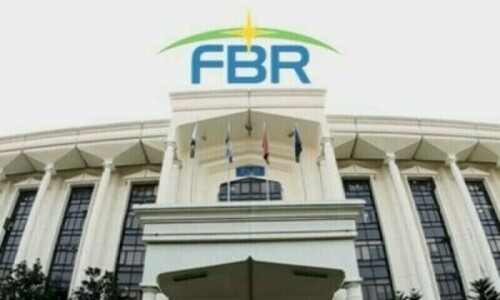• Ordinance to revamp Federal Board of Revenue may be promulgated this month
• Caretakers, key stakeholders determined to transform revenue machinery
ISLAMABAD: The caretaker government is rapidly advancing plans to restructure the country’s revenue machinery, with an ordinance aimed at reducing reliance on human discretion and enhancing the stagnant tax-to-GDP ratio likely to be promulgated within the next fortnight.
Informed sources said the caretaker government and other key stakeholders, except the revenue staff, were determined about the restructuring and reorganisation of the federal revenue machinery and wanted the plan well before the general elections scheduled on Feb 8, despite strong internal resistance from entrenched beneficiaries.
An ordinance for restructuring the Federal Board of Revenue (FBR) could be promulgated this month, provided caretaker Finance Minister Dr Shamshad Akhtar is able to convince the federal cabinet and the Special Investment Facilitation Council (SIFC) about the effectiveness of the proposed independent structure and the stature of the members of oversight policy boards capable of ensuring an effective, equitable and progressive tax regime.
The SIFC has already signalled preliminary approval for the restructuring plan. An official said the federal cabinet may take up a formal and updated summary before the weekend, explaining that the caretakers had the justifications to push for the FBR’s reorganisation. This move, however, faces staunch opposition from the tax bureaucracy and their political allies, who have historically resisted such reforms.
The caretakers, particularly Dr Akhtar, attribute the country’s underwhelming tax performance to the FBR’s outdated organisational structure.
Their strategy aims to eliminate inefficiencies and introduce accountability mechanisms to combat corruption and underperformance. This includes appointing non-FBR members to oversight boards, thereby disrupting the conflict of interest that currently hampers optimal tax collection and management.
‘Privileges’ at risk
The revenue bureaucracy is wary of losing “privileges” in the restructured FBR, fearing reforms that may challenge their current practices. The taxmen presently feel at liberty to expedite their promotions to senior grades by creating “ghost” field formations and getting more posts sanctioned in the name of such redundant formations that exist in the present set-up.
The taxmen also feel free in the tax machinery’s existing structure to create and put in practice money-making strategies, which are seldom visible and known to outsiders and largely operate with the knowledge of the high-ups who become “partners in crime”.
Massive frauds by customs collectors in Karachi in the recent past and their facilitation of smugglers suggest how conflicts of interest within the system negatively affect revenue collection.
Another well-known money-making practice involves anti-smuggling officials facilitating smuggling on roads, whereas bigger smugglers pay regular monthlies and go scot-free. Raids are conducted on shops and stores whose owners lack a similar organised structure of monthlies. Apparently, this also remains invisible to the top brass due to potential conflicts of interest.
Another such imperceptible strategy is the insertion of one or two clauses or provisions in the finance bill. A provision inserted in the Customs Act a few years ago empowering customs collectors to issue valuation rulings for imported goods caused incalculable damage to revenue collection at the import stage but helped the collectors amass massive amounts.
A customs collector who extensively misused this provision and caused revenue losses in billions of rupees was charged, but the charge sheet was later withdrawn and the officer was elevated to Grade 21.
The valuation frauds in the customs machinery are the cause of the biggest revenue losses at the import stage. A provision was inserted some years back in the customs law requiring the placement of a copy of the invoice of imported goods in the containers to thwart attempts of valuation fraud.
However, the taxmen later succeeded in removing this check on valuation frauds and enhanced their own valuation discretion by omitting the relevant provisions of the customs law through the Finance Act 2023.
Despite past discussions on reforming the tax system and separating tax policy from collection, successive governments have made little progress, often taking one step forward and two steps back.
Published in Dawn, January 22nd, 2024













































Dear visitor, the comments section is undergoing an overhaul and will return soon.